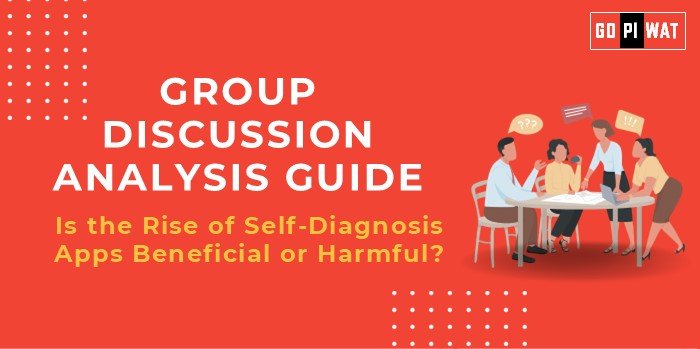📋 Group Discussion Analysis Guide: Is the Rise of Self-Diagnosis Apps Beneficial or Harmful?
🌐 Introduction to the Topic
💡 Opening Context: “The increasing reliance on technology has revolutionized healthcare, with self-diagnosis apps becoming prominent tools for health management.”
📖 Topic Background: These apps use algorithms to provide preliminary health assessments based on user-input symptoms. Launched alongside the growth of mobile internet and AI, they target issues like access to healthcare in remote areas.
📊 Quick Facts and Key Statistics
- 🌍 Global Self-Diagnosis App Market: Valued at $5.2 billion (2023), expected to grow at 18% CAGR by 2030.
- 📱 Usage Rate: Over 40% of smartphone users globally have tried a self-diagnosis app at least once.
- ✅ Accuracy Concerns: Studies show 60-70% diagnostic accuracy compared to trained professionals.
- 💸 Healthcare Accessibility: 60% of users in developing nations cite reduced healthcare costs as a benefit.
🔍 Stakeholders and Their Roles
- 💻 Developers and AI Innovators: Build algorithms and maintain data accuracy.
- 🩺 Healthcare Providers: Integrate app-generated data into professional diagnoses.
- 🏛️ Governments and Regulators: Enforce ethical use and privacy norms.
- 🙋 Consumers: Use apps for preliminary diagnosis and monitoring.
🏆 Achievements and Challenges
Achievements
- 📈 Accessibility: Overcomes barriers to healthcare in remote areas.
- ⏰ Early Detection: Promotes awareness and early intervention for chronic conditions.
- 💰 Cost Efficiency: Reduces dependency on physical consultations, saving costs.
Challenges
- ⚠️ Accuracy Risks: Over-reliance can lead to misdiagnosis or delayed treatment.
- 🔐 Data Privacy: Personal health data breaches remain a concern.
- 🧠 Psychological Impact: Heightened health anxiety due to false positives.
🌍 Global Comparisons
- 🇺🇸 United States: Apps like Ada and WebMD are integrated with telemedicine services.
- 🇮🇳 India: Government-backed initiatives such as Ayushman Bharat Health Mission emphasize app use for preventive care.
📜 Case Study
India’s eSanjeevani Telemedicine Service: Over 10 million consultations in underserved regions highlight its role in addressing healthcare gaps.
💬 Structured Arguments for Discussion
- ✅ Supporting Stance: “Self-diagnosis apps democratize healthcare by making medical insights accessible and affordable.”
- ❌ Opposing Stance: “Over-reliance on self-diagnosis apps risks incorrect treatments, undermining patient safety.”
- ⚖️ Balanced Perspective: “While these apps provide healthcare access, robust validation mechanisms are essential to ensure accuracy and safety.”
📖 Effective Discussion Approaches
Opening Approaches
- 📊 Data-Driven Start: “With a market value of $5.2 billion, self-diagnosis apps redefine healthcare access globally.”
- 📋 Scenario Presentation: “Imagine relying on an app that predicts a serious illness but turns out inaccurate—what’s at stake?”
Counter-Argument Handling
- 🧠 Accuracy Debate: “While concerns exist, integrating AI advancements and regulatory oversight enhances reliability.”
- 🔒 Privacy Concerns: “Data breaches highlight risks, but encryption and compliance frameworks are mitigating factors.”
📌 Strategic Analysis of Strengths and Weaknesses
Strengths
- 🌍 Accessible and user-friendly.
- 💸 Cost-effective solutions for primary health checks.
- 📢 Raises health awareness globally.
Weaknesses
- ❓ Inconsistent diagnostic accuracy.
- 🔒 Privacy vulnerabilities and data misuse risks.
Opportunities
- 🤝 Integration with telemedicine services.
- 📱 Expanding AI and machine learning capabilities.
Threats
- ⚖️ Legal and ethical challenges.
- 🏥 Competition with traditional healthcare professionals.
🎓 Connecting with B-School Applications
- 💡 Real-World Applications: Exploring health-tech start-ups for projects on tech-driven healthcare solutions.
- 📋 Sample Interview Questions:
- “Can AI-based self-diagnosis apps replace traditional consultations in rural areas?”
- “What business strategies can healthcare apps adopt to improve accuracy and privacy?”
- 📚 Insights for B-School Students:
- Assess ethical AI implementation.
- Explore market growth opportunities in digital health.


